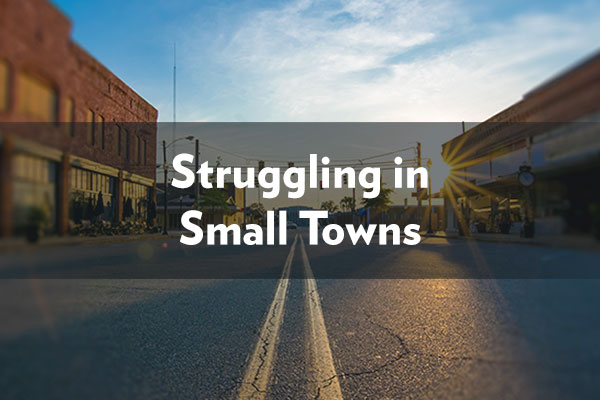Media

Pennsylvania’s Small Towns Need Harrisburg to Think Big
The stories are all too familiar. In towns hollowed out by economic downturns, Pennsylvanians are struggling to get by. Many are wondering when, or if, things will get better.
Small Town, Pennsylvania—a special project spearheaded by PublicSource—provides a glimpse into the struggles and concerns in the commonwealth’s little-know communities. One story focuses on the town of Petrolia. A chemical plant located in the town is scheduled to close next month, which is likely to bring economic hardships for people like Bobbi Boltz who depend on the plant to make ends meet:
Bobbi Boltz said she felt fortunate when she was offered a position at INDSPEC 21 years ago. Her husband was killed the week before the job offer in a hit-and-run accident, and she had two young daughters depending on her. The job “was a gift from heaven,” she said. “I was proud to go to work.”
Her father, brother, sister–in-law, two brothers-in-law and uncle all worked at the plant, too.
Boltz, 53, who made $32 an hour at INDSPEC, is unsure what she will do next: “I don’t know what I want to be when I grow up,” she said with a laugh.
Outside of Petrolia, the New York Times profiled Dawn Nasewicz—a small business owner in Johnstown, whose shop is on the brink of closing:
Dawn Nasewicz comes from a family of steelworkers, with jobs that once dominated the local economy. She found her niche in retail.
She manages a store, Ooh La La, that sells prom dresses and embroidered jeans at a local mall. But just as the jobs making automobile springs and rail anchors disappeared, local retail jobs are now vanishing.
“I need my income,” said Ms. Nasewicz, who was told that her store will close as early as August. “I’m 53. I have no idea what I’m going to do.”
Johnstown’s problems are nothing new. The area has lost 19 percent of its retail jobs since 2001, according to the Times. This is on top of the decades-old decline in manufacturing.
While the people in these communities are invested in turning things around, they need help from Harrisburg. . . they need Harrisburg to get out of the way.
A similar story is unfolding in Fayette City. Tim Carney of the Washington Examiner profiled the area during the height of last year’s presidential campaign:
As bad as Uniontown is, Fayette City is worse. Main Street in this small town on the Monongahela River is rotting. The old Fayette City Community Center is dilapidated, with broken windows and rotting signs. The boarded-up storefront is the rule. The exception is a business still operating, such as Vargo's, a clean, but thinly-stocked newsstand.
At Vargo's on Tuesday morning, the Duda men — Mr. Duda and Junior — were passing the time. They live just down the road in Washington township. They shake their heads at the local economy.
Mr. Duda was a steelworker. “He worked 40 years at the mill,” his son brags. Now almost no jobs are left. “If you just drive down the river roads, from here through Monessen,” Junior says, “it's all shut down.”
Mr. Duda’s perception is borne out by the data. Fayette County, where Fayette City is located, has the second highest unemployment rate in Pennsylvania—at 6.9 percent, which is well above the state and national average.
Countless other struggles, both told and untold, are the norm for too many Pennsylvanians. And while the people in these communities are invested in turning things around, they need help from Harrisburg. More accurately, they need Harrisburg to get out of the way.
The state imposes a crushing tax burden and requires entrepreneurs to navigate a regulatory maze all the while subsidizing politically-connected corporations.
Pennsylvania must embrace transformative policies to help communities from the shores of Erie to the crowded streets of Philadelphia. Avoiding tax hikes is a good short-term goal, but it's just not enough.
American liberty was born in Pennsylvania but our state has fallen behind because state government forgot that the greatest antidote to stagnation and poverty is economic freedom.
Any type of revitalization starts with rediscovering this truth.